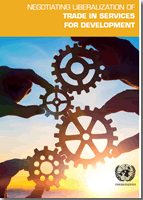
As the focal point of the United Nations for the integrated treatment of trade and development and interrelated issues, the UNCTAD secretariat supports developing member States, including the least developed member States, and member States with economies in transition in achieving their beneficial and fuller integration into the international trade and world economy for sustainable development. Through intergovernmental deliberations and consensus-building, research and analysis, and capacity-building technical assistance, UNCTAD’s work on trade negotiations and commercial diplomacy aims at enhancing the human and institutional capacities of these member States to analyse, formulate and implement appropriate policies and strategies for trade goals as well as for bilateral, regional and multilateral trade negotiations to assure development gains from international trade, the trading system and trade negotiations.
Services trade policies, in any country, determine the direction of policy reforms and the role which services trade should play in the broader context of growth and development strategies. Regulators, taking guidance from these policies, introduce the regulatory measures that serve the objectives of such policies. National policies and regulations then inform the positions taken by services trade negotiators to achieve outcomes that are supportive of national policy objectives and national development. In fulfilling their responsibilities, policy makers, regulators and negotiators need to be mindful of the multilateral trade rules governing international trade in services and related negotiations. The complexity of the subject matter has often been cited as a challenge.
The purpose of this publication is to assist trade policy makers, regulators and trade negotiators in considering their decisions regarding trade in services and services negotiations in the overall national development context. It could also be useful for other stakeholders involved or interested in services negotiations and policymaking, including the private sector, researchers and non-governmental organizations. The publication seeks to do so by providing a balanced, objective and sound analysis of the technical and policy issues about the rules and negotiations on trade in services and explore possible ways to address the above-mentioned challenge, especially under the General Agreement on Trade in Services (GATS) of the World Trade Organization (WTO).
A brief analysis is also conducted regarding services negotiations in the regional integration context.



